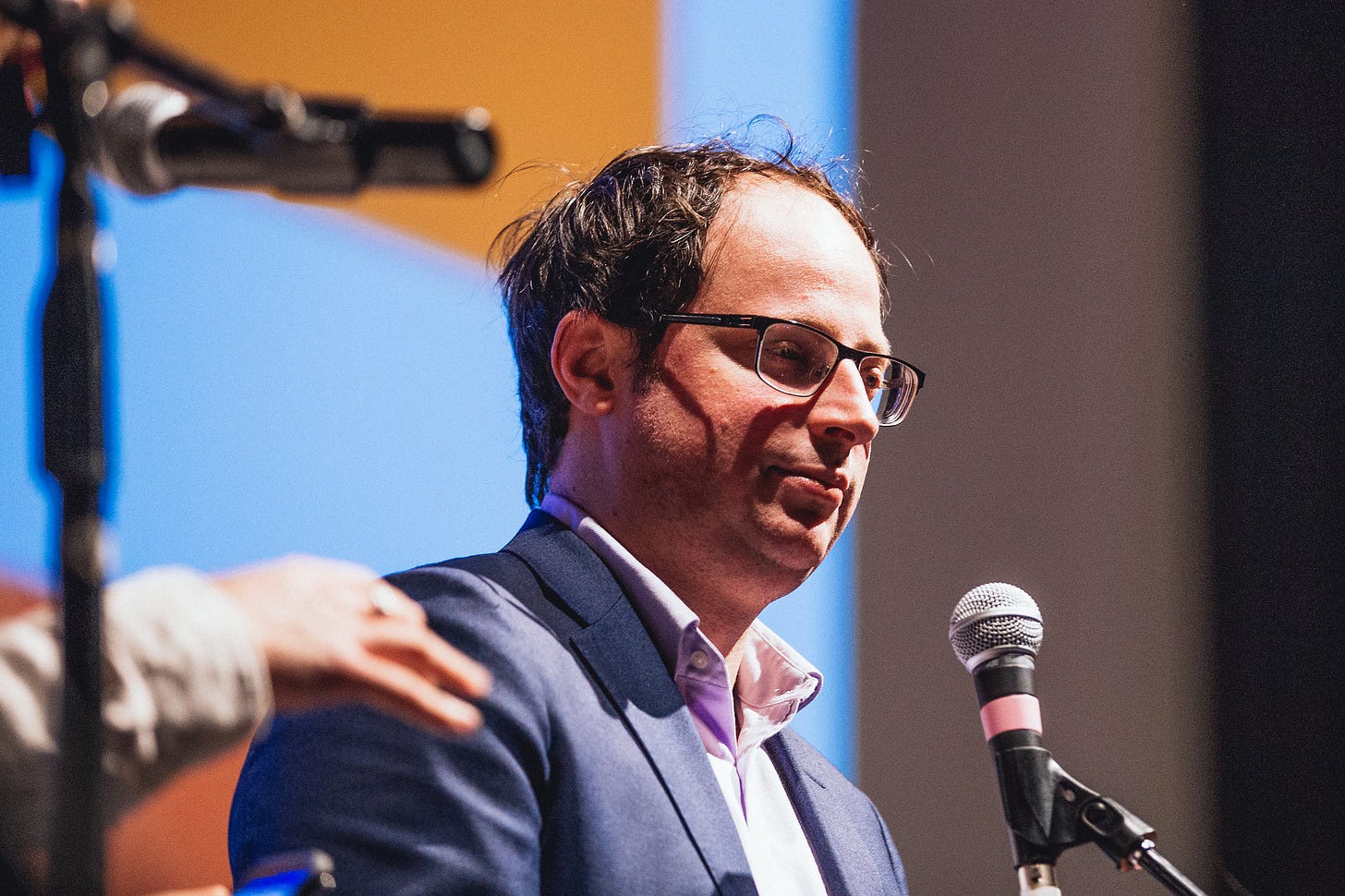"Stand in the way and fate will simply go around."
We may be at an inflection point in the media personality ecosystem and, as such, Nate Silver is becoming a free agent at an auspicious time.
This week’s soundtrack: Converge & Chelsea Wolfe - “Crimson Stone”
Nate Silver is a somewhat controversial figure and one who, unfortunately, embodies the social media age. Silver is very good at what he does, but was both pumped up too much in his early fame (causing heavy expectations and, thus backlash) and he’s, let’s say, not the most charming fellow in the world, so he can use social media to get into stupid arguments with some of the most annoying people in the world.
(A small aside: The backlash to Silver in 2016 was entirely because Americans don't understand basic statistics and probabilities. The FiveThirtyEight model had an almost 30% chance that Trump would win. Those are great odds! If I told you that there was a 30% chance that an anvil was going to fall on you if you went out today, you’re not walking out the door. At all. It’s big odds. )
All that said, his current situation is one to note when it comes to the media industry, “stardom” and our current landscape. Silver is an exception to the rule that legacy media organizations make personalities and not vice versa. But, he also sits in the ether of the dying embers of legacy media dominating smaller outfits and further fragmented audiences segmentation.

The news media is not known for being full of shrinking violets or people who don’t enjoy the spotlight and the modern Internet/media environment has expanded that from just TV to everyone. I cannot tell you how much I’ve been told in my 20 years in the business (my college graduation was, in fact, 20 years ago today) that I need to expand my “personal brand” (hence this newsletter).
Some people take that to heart more than others. They do so to the point, presumably, that they think the audience loves them more than whatever convenience their employer gives them. Habits are habits and it’s way easier to keep flipping on Fox News than to figure out how to watch a TV show on Twitter.
The examples are not hard to find. Megyn Kelly bet on herself over Fox News and lasted all of thirteen months at NBC. Though she was paid handsomely, she lost a ton of audience and Fox just kept on with other anchors. Her coworker Bill O’Reilly got canned from from Fox and ended up with an average-rating podcast and a bunch of books. O’Reilly didn’t leave of his own accord, but both cases show that their audiences were Fox audiences, not fans of O’Reilly or Kelly.
It’s not just TV. Bari Weiss and Andrew Sullivan took their proverbial talents to Substack but eschewed legacy media careers to do so. As such, they get much less exposure by the osmosis of the simple economies of scale that orgs like the New York Times and The Atlantic have. Weiss, of course, is particularly fascinating because she is a favorite of the usual conservative-don’t-call-us-conservative/anti-woke types who will bankroll her goofy ideas like the University of Austin. As always, it helps to have rich friends (more on that in a bit).
Silver’s reason for his not renewing his contract this coming summer is that ABC/ESPN/Disney has been cost-cutting and a lot of FiveThirtyEight’s staff got cut.
…About two-thirds of the FiveThirtyEight staff had been laid off as part of an ongoing series of job cuts at Disney. It wasn’t that much of a surprise given the depth of the Disney layoffs. But it was still devastating news. I’ve been at Disney for almost 10 years and it’s sad that my time is coming to an end.
As you can probably tell by the first paragraph of this newsletter, I’m a fan of Silver’s. His and his colleagues’ work during the heyday of Baseball Prospectus was transformative in the ways that average baseball fans understand the game. The first iteration of FiveThirtyEight was superlative and looked at polling in a way that others did not; it made him a hot property. He bounced from the Times to ABC/ESPN/Disney during ESPN’s personality-fetish era (remember Grantland?) and Silver amassed a spectacular staff there. I find him annoying on the FiveThirtyEight podcast and I could not imagine hanging out with him – I’m deeply annoying and I find him unctuously condescending– but I respect his work.
It’s not lost on me that Substack is his place for writing all of this. In a previous world, it’d be on NateSilver.com or there’d be a NotesApp thing on Twitter or even on Instagram. Substack, for all of its faults, is becoming a place for people to do this sort of thing.
Silver’s savvy, for sure. As he wrote in his Substack post, he’s been writing a book on gambling and risk and, more importantly, he didn’t sign over his prediction model to Disney/ESPN/ABC when he went there (more here on the dumbasses who were caught off guard by this over at Disney/ESPN/ABC ). He owns his IP and can take it wherever he wants. That cannot be understated. Anyone who has ever accidentally gotten on a campaign email list knows that “Nate Silver predicts…” is a oft-repeated start of email subject lines. His word, at least in those campaign emails, is bond and that personal branding is, as mentioned above, the exception to the rule because of the work that he has done.
He’ll have options, presumably, at many legacy media operations because he’s not Kelly or O’Reilly. That would be the way to keep the largest possible audience. But, I also want to think about the other option: The Glenn Beck/Dan Le Batard/Bill Simmons option.
Beck, Simmons and Le Batard all went on their own after working at legacy media to create successful – depending on your definition – media networks. After Beck unceremoniously left Fox in 2011, he started a subscription-based onlineish network service called The Blaze. You probably don’t watch or know about the Blaze, but it has become a popular network in conservative media spheres, to the point that nearly 100 TV providers carry it on their cable systems.
(I should note that Beck’s rise has been far from linear. He’s been an exile and the network of which he’s the face has hardly been a wild success in anything resembling a mainstream notion – more on that in a bit. I also want to note that I find Beck awful and the content on the Blaze only slightly better than OAN and NewsMax; it’s a conspiracy haven and a bigoted parade of morons. More than anything, I just want to note his success as someone who struck out on his own instead of going to a rival network)
Le Batard’s ending with ESPN was similarly acrimonious and has proven to be similarly lucrative. When he left ESPN because of the layoff of one of his producers – sound familiar? – the festering wound that was “stick to sports” got him to leave and embark on his own thing. A bidding war ensured; Sirius was in on it, but gambling money prevailed and DraftKings became Le Batard’s “partner” (sugar daddy) on his Meadowlark Media venture. He’s since expanded that reach.
Simmons is a different, if similar, case. He’s had more fits and starts – remember Grantland? – but found funding from different sources, including HBO, when he founded the Ringer. Since, he cashed in and Spotify paid him very handsomely to own the thing he runs.
Simmons, Le Batard and Beck are, arguable, lesser stars than when they were when they were on ESPN and Fox. But, they are also illustrative of the increasingly siloed nature of our news environment. In each case, they may have lost the broader audience, but gained diehards. But, it should also be noted that each – the Ringer less so, but Spotify is no shrinking violet – is working with more conventional, old time distribution methods to get their content to the world. DIY, this is not; the Blaze is now on cable systems, Meadowlark works with Apple TV and now Samsung network, plus the Ringer/Spotify thing (and the failed HBO experiment). The hybrid model will work for this moment, while people still have cable packages and networks broaden (presumably before they contract), but I’m curious as to what is coming next. Silver is positioned to find out.
We’re at an inflection point between traditional media and upstart media, between older audiences (TV, all in one place) and younger (everything else, everywhere) audiences. The implications for this lack of monoculture are bad, for sure (we can’t agree on reality, clearly), but the economics of it are fairly interesting. As such, audience metrics will be where the real inflection point happens. A story I often tell of my education in the media business was during J school and a professor made an aside about golf tournament TV advertising going for way more money than things rated far more highly. The reason? People who watch golf have lots of money, whereas people who watch Springer may not. Where that applies here is different, but very similar – history doesn’t repeat, but rather rhymes.
I mentioned that networks get larger audience numbers, but a lot of those numbers are people with a show on in the background. Le Batard has joked that more people had seen him on mute when he was on ESPN than anything; ultimately, a lot of conventional shows don’t get the kind of passion that these, uh, passion projects do. Le Batard’s fandom is extremely passionate and, well, cultish. If Le Batard asks his fandom to help out a cause, they do it. Advertisers love that sort of thing. Beck lost audience by launching the Blaze, but the people he got really came with him. Alex Jones’ business model was largely based on this (though, he’s a bad example for obvious reasons) in that his fans believe that his brain pills work and buy them in congruence with this belief.
As mentioned above, there is risk in striking out on one’s own. As mentioned, the potential audience loss is very real. But, more importantly, the startup money is fairly large for the types of ideas that these ego monsters usually have. Le Batard got $50M just from DraftKings to scale up his “pirate ship” ($50M will buy you quite a ship). Silver is a fairly avid card player (and, as mentioned, he’s writing a book on gambling, so the gaming concerns that are increasingly flush with money could do what DraftKings did with Le Batard. Unlike the huge media companies, they’re not fighting with their workforce right now.
GovExec Daily
With the end of the public health emergency last week, we had a reporters roundtable on the podcast to talk about what it ~means~ for the feds. In short, the big thing is telework and how feds will now fight with their managers about where and when they work. I’m kind of a telework defender, so I’ll be interested in seeing how it goes.
Otherwise, the debt ceiling continues to dominate my brain, so we had University of New Haven’s Patrick Gourley to talk about the wide-reaching effects a default/breach could have.
Lulu Update
As someone who has had bulldogs for nearly 20 years now, Lulu is definitely the one with the weirdest personality. She is very smart and knows how to get me to play tug with her. It’s one of her favorite games.
She also loves a ball. A squeaky spiky one, specifically.
A Recommendation:
Monsters: A Fan’s Dilemma by Claire Dederer
You may know Claire Dederer’s work from her essays in places like The Atlantic or The New York Times and, not shockingly, her new book is super good. Her latest has some roots in a Paris Review piece she wrote six years ago about what to do with great art made by awful men. The book, Monsters: A Fan’s Dilemma, is terrific in the ways she grapples with these ethical conundra, from Polansky to Cosby to Allen to others. She’s got an artful style and a terrific voice. I highly recommend it.




